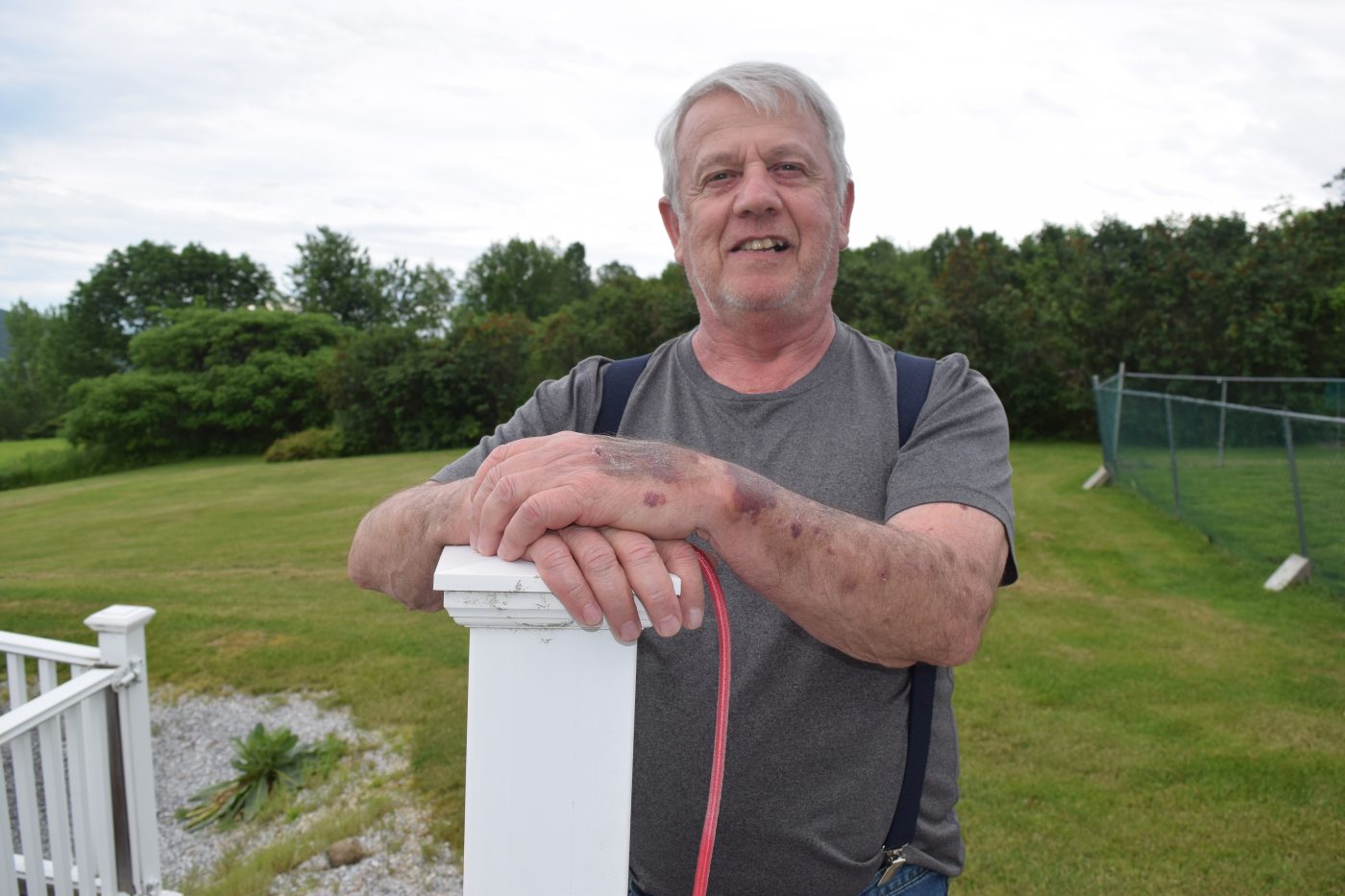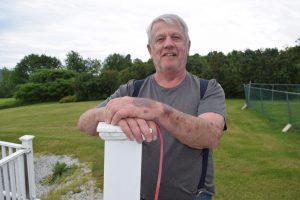Rural Vermont Couple Talk of Huntington’s ‘Crippling’ Financial and Emotional Toll
Written by |

Joe Lacroix, 67, outside his home in Milton, Vermont. (Photos by Helen Simon)
Linda Lacroix of Milton, Vermont, never imagined that at the age of 68, she’d be working as a lunch lady at the local high school cafeteria.
But that’s what she’s had to do to pay the mortgage on the family home so her 67-year-old husband, Joe, has a place to die peacefully when he finally succumbs to Huntington’s disease (HD) — a progressive disorder resulting from an inherited gene mutation.
“Joe wants to die in the house, and in order to keep the house I had to go back to work,” said Linda, who makes $12 an hour after earning twice that during her 30 years of employment at a local computer-chip factory.
Degenerative diseases like Huntington’s take a toll on patients’ physical and mental health, as well as that of their families. But they can also bankrupt family finances and retirement pensions.
Linda and Joe both worked for the same employer, which paid above-average wages and benefits. For 35 years the native Vermonters have lived on a 10-acre hillside homestead with a mix of open fields and woods. Joe, a friendly, easygoing man with a passion for fixing and building things, prided himself on his ability to maintain the property and help his neighbors.
But when he turned 50 he began developing signs of the illness that had devastated his mother, and at 55 he was encouraged to retire from work as his symptoms became progressively worse.
Joe acknowledged that his performance had slipped and accepted his employer’s decision.
“If they showed me something new, I couldn’t retain it,” he said as he sat in a rocker in the couple’s home overlooking mountains and a lake.
But Linda was angry.
Huntington’s financial burden
“They forced him out of there,” she said bitterly, adding that the company chose to have him retire rather than use its disability benefits, because letting him go was cheaper. “He could have gone through disability and gotten more money, but his manager made him retire.”
With Joe home alone all day and in danger of falling — a problem common among those with Huntington’s — Linda decided to retire at age 60, instead of 65, so she could take care of him. That meant less money in her 401(k) retirement savings account and her pension, and smaller Social Security payments.
“Financially, it crippled us,” Linda said.
Both she and Joe had to use their 401(k) savings to live on, because Joe couldn’t collect government disability for a year after retiring and Linda had to wait until age 62 to apply for Social Security. “If we didn’t have the pension, I don’t know where we’d be,” Linda said.
When she turned 67, the age at which the Social Security Administration stops penalizing people who earn extra income, Linda got a job to help ease the financial stress.
“I had to go back to work because we’d blown through all our money,” she said.
Not only has the disease affected the couple’s income, but the medicine needed to live with it adds to their economic burden. Joe’s case is further complicated by the fact that he also has rheumatoid arthritis (RA), which causes a lot of pain.
“We have a special credit card that just pays for his medicine because we can’t afford it,” Linda said.
An uncertain future
Joe’s medication list includes a dozen different medications. About half are for the RA; others are for depression, anxiety and mood swings related to HD. He also takes Teva Pharmaceuticals‘ Austedo (deutetrabenazine) for this disease’s involuntary movements, also known as chorea.
In this regard, Joe considers himself fortunate. A number of years ago, when he’d already developed chorea and difficulty walking, he participated in a clinical trial for Austedo, which went on to be approved by the U.S. Food and Drug Administration in 2017. In return, Teva agreed to supply him the medication free of charge. If it hadn’t been for that, his quality of life would be dramatically lower because he and Linda could never afford the medication’s roughly $4,000-a-month cost.
Without Austedo, he wouldn’t be able to walk. “I wouldn’t be sitting here,” Joe said. “The movements would be all over the place.”
Adding to their economic worries is the strain of trying to plan their future finances with a disease that affects everyone differently. They’ve watched three family members die of Huntington’s — Joe’s mother and two of his nine siblings. In the support group they started attending 18 years ago, Joe is the only initial member still alive.
Although Joe says HD doesn’t cause him any pain — he has plenty of that from the arthritis — he’s acutely aware of his muddled thinking, lack of balance, the anxiety that causes him to withdraw socially, and the depression that stifles his former “get-up-and-go” spirit.
It’s recently become harder for him to swallow, which increases the possibility of choking.
“That’s a big one coming up now,” Linda said of the disease’s progression. “Some choose to go on the feeding tube, but Joe’s decided not to.”
Joe said he doesn’t know how it will all end, but he keeps doing what he can — going for walks with Linda and the dogs, household chores like vacuuming — and goes with the flow.
“I take it one day at a time and try not to plan too far in advance,” he said.







